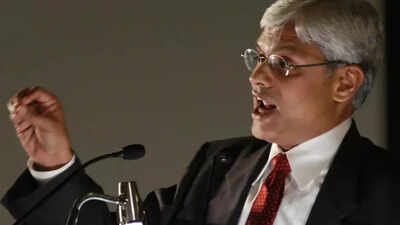
Ashley J. Tellis — long regarded as one of the most influential voices on South Asia and US foreign policy — is now at the centre of a sensational national security scandal. But before his arrest on charges of unlawfully retaining classified defence documents, Tellis was known less as a suspect and more as a strategist whose ideas shaped Washington’s approach to India, China, Pakistan, and the Indo-Pacific. Here’s what he has argued — and where he said it.
India
In his much-discussed 2025 essay “India’s Great-Power Delusions” in Foreign Affairs, Tellis argued that India’s ambitions far exceed its capabilities. New Delhi, he wrote, aspires to become a pole in a multipolar world but remains constrained by slow economic growth, limited military capacity, and weak institutions.He devoted significant criticism to India’s doctrine of “strategic autonomy.” While it preserves flexibility and sovereignty, he argued, it also prevents India from building deeper, alliance-like partnerships — especially with the United States, which he sees as essential to counterbalancing China.Tellis also warned that India’s “illiberal drift” — including democratic backsliding, polarisation, and majoritarian politics — weakens its global standing and soft power. These internal dynamics, he argued, risk undermining India’s claim to leadership among democratic nations.
China
In his co-authored essay “What Are China’s Nuclear Weapons For?” in Foreign Affairs, Tellis analysed Beijing’s evolving nuclear posture and coercive foreign policy.
He sees China as the defining strategic challenge of the 21st century — not just militarily, but ideologically, economically, and technologically.Tellis argued that Beijing’s strategy combines deterrence with coercion and that its ambitions extend well beyond regional dominance. India, he contends, must prepare for sustained strategic rivalry by deepening defence cooperation, boosting deterrence, and forging tighter partnerships — particularly with the US.
Pakistan
Though Tellis rarely focuses exclusively on Pakistan, his views on the subject are woven through several of his works, including his policy essay “India’s Grand Strategy: Navigating the Regional Trap” (Carnegie Endowment, 2022). He argues that Pakistan remains a structural constraint on India’s rise: the constant threat of conflict on its western border drains resources and strategic attention away from the larger challenge posed by China.He also warns that a potential two-front scenario, in which Beijing and Islamabad coordinate policy against India, poses a significant long-term risk. Regional instability, he argues, continues to undermine India’s ambitions of projecting power beyond South Asia.
The US and Trump
Tellis has been one of the strongest proponents of a deeper US–India strategic partnership, but he has also repeatedly cautioned Washington against unrealistic expectations.
In his 2023 essay “America’s Bad Bet on India” in Foreign Affairs, he argued that India will never automatically side with the US against China — its foreign policy will always be guided by its own interests and strategic autonomy.In speeches and essays such as “Trump, Trade, and the Indo-Pacific Order”, Tellis analysed how Donald Trump’s approach fundamentally reshaped the global order. Trump’s worldview, he argued, shifted the focus of great power competition from geopolitics to economics, prioritising tariffs, trade leverage, and industrial policy over alliances and ideological commitments.Tellis warned that this shift could downgrade India’s strategic importance if Washington begins to view it primarily as an economic competitor. He also highlighted the risks of Trump’s unpredictable policies — from visa restrictions to tariff threats — which, he said, threaten to erode decades of carefully built trust. Meanwhile, Pakistan, he noted, has exploited Trump’s transactionalism by positioning itself as a useful partner on counterterrorism.
The bottom line
Ashley Tellis has shaped how Washington thinks about South Asia for more than two decades — warning about India’s limitations (“India’s Great-Power Delusions”), analysing China’s coercive rise (“What Are China’s Nuclear Weapons For?”), assessing Pakistan’s destabilising role (“India’s Grand Strategy: Navigating the Regional Trap”), and critiquing US assumptions about partnership (“America’s Bad Bet on India”).His arrest may overshadow that intellectual legacy, but his ideas continue to shape debates about power, partnership, and strategy in the Indo-Pacific. And if the courtroom drama unfolds like the spy thriller it resembles, the irony will be hard to ignore: one of America’s most trusted strategic thinkers may have become entangled in the very geopolitics he spent a lifetime analysing.

 3 hours ago
2
3 hours ago
2










 English (US) ·
English (US) ·